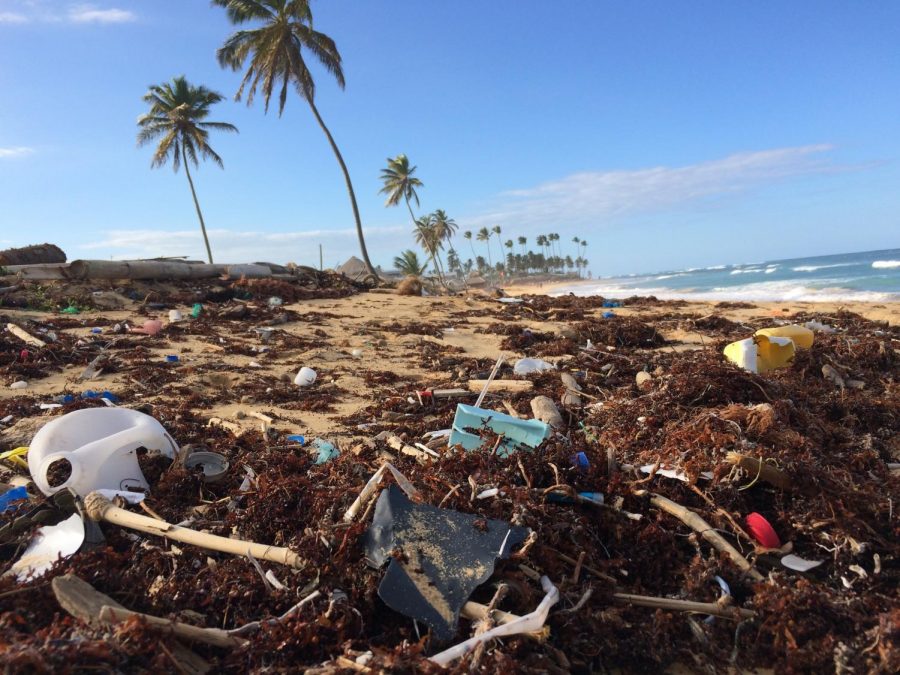The Careless Overuse of Plastic is Damaging Our Planet
With over 5.25 trillion pieces of plastic floating around in the Earth’s oceans, some of it makes its way onto our shores.
December 12, 2018
Plastic pollution is an obvious problem in our world today. Typically, waste goes into our oceans and since the ocean covers over 70 percent of the Earth’s surface, there are over 5.25 trillion pieces of plastic floating around. Think about it this way: every minute that goes by, a garbage truck full of plastic is dumped into the ocean. This number is constantly rising.
On Nov. 14, 2018, the Portland City Council voted yes on a decision to limit use of plastic straws. Straws and other plastic utensils will only be available if you ask. While this is a great step, it simply isn’t enough. We can stop using plastic straws, but what about the plastic bags we get at grocery stores, or the plastic cups at coffee shops and restaurants?
These plastic items, along with many others, are contributing to the Great Pacific Garbage Patch. If you are unaware of what this is, it is the largest of five swarms of plastic waste in the ocean. It is about twice the size of Texas and is growing daily.
We all contribute to this detrimental amount of plastic waste and may not even realize it. Studies show that for every person on earth, there are 150 plastic bags going to waste per year. That’s about 500 billion total bags.
The overuse of plastic in our everyday lives is affecting the human race and threatening the marine life living in the oceans. Because of all of this waste, many animals are dying due to the plethora of plastic that they are eating or choking on.
Animals cannot tell the difference between plastic and food. For example, plastic pellets look like fish eggs. We, as humans, can tell the difference, but animals cannot. A lot of the time, fish and birds are attracted to the smell of plastic, due to a chemical called dimethyl sulfide (DMS) that appears in both plastic and algae. When animals smell DMS, they eat it, whether it’s plastic or algae.
Their sight doesn’t help them much either. Turtles, for example, have different eyesight than humans. Due to their eyesight, there is a belief that turtles can mistake a plastic bag for a jellyfish. Consuming the plastic bags hurts and can even kill animals. If animals can’t tell the difference between plastic and food, why are we still polluting their homes?
The simple answer is that we shouldn’t be. It is cruel and heartless to contribute to the deaths of animals while knowing what we are doing.
We are essentially contributing to our own deaths as well.
Polluting the ocean harms humans through a number of ways. For example, because of all of the plastic in the ocean, eating things that contain sea salt exposes us to the plastic that is in it. Consuming animals also harms us. Animals in the ocean are eating plastic that contains many chemicals, which then endangers us when we eat the animals.
While limiting the use of plastic straws and utensils can help this ongoing problem, it is nowhere near enough. The Great Pacific Garbage Patch still exists, along with lots of other plastic floating around in the ocean. The question is, what can we do to stop the increasing amount of plastic polluting our oceans?
Here are a few things we can do to help decrease plastic use:
- Instead of using plastic straws at restaurants and coffee shops, use a paper straw or even better, buy reusable straws! It is extremely easy to order reusable straws online or even find them in a grocery store.
- Bring reusable bags to the grocery store. Using reusable bags will help ditch plastic bags that can take up to 1,000 years to decompose.
- Give up bottled water. Buying a reusable water bottle like a Hydro Flask, Yeti, or Mira lessens the amount of plastic water bottles going to waste.
- Try to avoid buying products that come in plastic packaging. Often there are alternative options for the same products; for example, laundry detergent can either come in a plastic bottle or a cardboard box.
- Be aware of how much plastic you use in your everyday life. Becoming aware of your own contribution to plastic pollution and letting others know how they can take steps to decrease their plastic waste can make a huge difference. One person’s actions can start a domino effect that can put a stop to this ongoing problem.
If we all take steps to reduce plastic pollution, we can work toward saving not only animals, but the Earth as a whole.
Photo by Dustan Woodhouse on Unsplash. Used with permission.






Mario De Ieso • Dec 13, 2018 at 3:05 pm
Nice article Nicole. Its crazy to think how much plastic we use. Now that Portland no longer offers recycling of many hard type plastics its depressing to think landfills are the destination. I’m hopeful, however that we can come up with a solution for the planet. Reduce. Reuse. Upcycle.
Stephanie Avery • Dec 13, 2018 at 8:19 am
Love this article! Thank you for bringing up this issue while also providing suggestions to promote change.